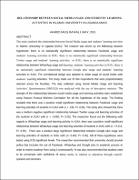| dc.contributor.author | Wali, Ahmed | |
| dc.date.accessioned | 2018-08-29T10:06:38Z | |
| dc.date.available | 2018-08-29T10:06:38Z | |
| dc.date.issued | 2015 | |
| dc.identifier.citation | Wali , A. (2015). Relationship between Social Media Usage and Students’ Learning Activities in Islamic University in Uganda Main Campus. Islamic Universiy In Uganda. Dissertation. | en_US |
| dc.identifier.uri | http://hdl.handle.net/20.500.12309/604 | |
| dc.description.abstract | The study explored the relationship between Social Media usage and students’ learning activities in Islamic University in Uganda (IUIU). The research was driven by the following research hypotheses: there is no statistically significant relationship between Facebook usage and students’ learning activities in IUIU, there is no statistically significant relationship between Twitter usage and students’ learning activities in IUIU, there is no statistically significant relationship between WhatsApp usage and learning students’ learning activities in IUIU, there is no statistically significant relationship between Google plus usage and students’ learning activities in IUIU. The correlational design was adopted to relate usage of social media with students’ learning activities. The study made use of 354 respondents that were proportionately selected across the faculties. The data collected using Social Media Usage and learning Activities’ Questionnaires (SMULQ) was analyzed with the use of descriptive statistics. The strength of the relationships between social media usage and learning activities were established using Pearson Product Moment Correlation for all the hypotheses of the study. The finding revealed that there was a positive small significant relationship between Facebook usage and learning activities of students in IUIU with (r = .190, P< 0.05). The study also showed that there was a medium negative significant relationship between Twitter usage and learning activities of the students in IUIU with (r = -0.660, P< 0.05). The researcher found out the following with regards to WhatsApp usage and learning activity in IUIU, there was a positive small significant relationship between WhatsApp usage and learning activities of students in IUIU with (r = 0.213, P< 0.05). There was a positive large significant relationship between Google plus usage and learning activities of students in IUIU with (r= 0.463, P< 0.05). All of these hypotheses were tested using 0.05 significant levels. The researcher recommended that university should provide policy that includes the use of Facebook, WhatsApp and Google plus in academic process in order to restrict students from using it unnecessarily. It was also recommended that students need to be conversant with usefulness of social media in relation to education through experts’ opinions and seminars. | en_US |
| dc.language.iso | en | en_US |
| dc.publisher | Islamic Universiy In Uganda | en_US |
| dc.subject | Social Media | en_US |
| dc.subject | Students’ Learning Activities | en_US |
| dc.title | Relationship between Social Media Usage and Students’ Learning Activities in Islamic University in Uganda Main Campus | en_US |
| dc.type | Thesis | en_US |

